 > LoSpazioBianco" />> LoSpazioBianco" />> LoSpazioBianco" height="200" width="600" alt="SM50: Interview with Bob McLeod >> LoSpazioBianco" class="aligncenter" />
> LoSpazioBianco" />> LoSpazioBianco" />> LoSpazioBianco" height="200" width="600" alt="SM50: Interview with Bob McLeod >> LoSpazioBianco" class="aligncenter" />
 > LoSpazioBianco" />> LoSpazioBianco" />> LoSpazioBianco" height="65" width="600" alt="SM50: Interview with Bob McLeod >> LoSpazioBianco" class="aligncenter" />
> LoSpazioBianco" />> LoSpazioBianco" />> LoSpazioBianco" height="65" width="600" alt="SM50: Interview with Bob McLeod >> LoSpazioBianco" class="aligncenter" />
 > LoSpazioBianco" />> LoSpazioBianco" />> LoSpazioBianco" height="160" width="125" alt="SM50: Interview with Bob McLeod >> LoSpazioBianco" class="wp-image-60121 alignright" />(From Wikipedia) Bob McLeod (1951, Tampa FL Usa) is an American comic book artist best known for co-creating the New Mutants with writer Chris Claremont. Bob McLeod was educated at Auburn University and the Art Institute of Fort Lauderdale. He began his career working in the production department of Marvel Comics in 1973 on an recommendation from Neal Adams, but soon began penciling and inking for Marvel’s Crazy magazine, doing several movie satires and the “Teen Hulk” strip. He was a member of The Crusty Bunkers inkers while working at Adams’ Continuity Studios, then went on to become a top inker at Marvel and DC on many series, including The Incredible Hulk, Conan the Barbarian, The Legion of Super Heroes, Detective Comics, Wonder Woman, and The New Titans, as well as penciling Star Wars and several Spider-Man fill-ins for Marvel.
> LoSpazioBianco" />> LoSpazioBianco" />> LoSpazioBianco" height="160" width="125" alt="SM50: Interview with Bob McLeod >> LoSpazioBianco" class="wp-image-60121 alignright" />(From Wikipedia) Bob McLeod (1951, Tampa FL Usa) is an American comic book artist best known for co-creating the New Mutants with writer Chris Claremont. Bob McLeod was educated at Auburn University and the Art Institute of Fort Lauderdale. He began his career working in the production department of Marvel Comics in 1973 on an recommendation from Neal Adams, but soon began penciling and inking for Marvel’s Crazy magazine, doing several movie satires and the “Teen Hulk” strip. He was a member of The Crusty Bunkers inkers while working at Adams’ Continuity Studios, then went on to become a top inker at Marvel and DC on many series, including The Incredible Hulk, Conan the Barbarian, The Legion of Super Heroes, Detective Comics, Wonder Woman, and The New Titans, as well as penciling Star Wars and several Spider-Man fill-ins for Marvel. 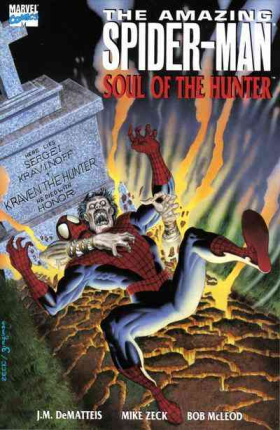 > LoSpazioBianco" />> LoSpazioBianco" />> LoSpazioBianco" height="226" width="147" alt="SM50: Interview with Bob McLeod >> LoSpazioBianco" class="alignleft size-full wp-image-60110" />McLeod penciled the graphic novel and the first three issues of New Mutants and inked a number of subsequent issues. In 1987, he inked Mike Zeck‘s pencils on the famed Kraven’s Last Hunt storyline in the Spider-Man titles. At DC Comics, he was the artist on Superman in Action Comics in the early 1990s. He helped writer Louise Simonson and artist Jon Bogdanove launch a new Superman title, Superman: The Man of Steel in July 1991. With writer Roger Stern, McLeod contributed to such Superman tales as the 1991 story wherein Clark Kent finally revealed his identity as Superman to Lois Lane and the “Panic in the Sky” crossover in 1992. There were several issues of The Phantom comic book drawn by McLeod for the Swedish publisher Egmont. He has written and illustrated a children’s book, Superhero ABC, which was published by HarperCollins in 2006 and received starred reviews from School Library Journal and ABA Booklist. McLeod currently teaches part-time at the Pennsylvania College of Art and Design in Lancaster, Pennsylvania, edits Rough Stuff magazine for TwoMorrows Publishing, and works on various commercial projects.
> LoSpazioBianco" />> LoSpazioBianco" />> LoSpazioBianco" height="226" width="147" alt="SM50: Interview with Bob McLeod >> LoSpazioBianco" class="alignleft size-full wp-image-60110" />McLeod penciled the graphic novel and the first three issues of New Mutants and inked a number of subsequent issues. In 1987, he inked Mike Zeck‘s pencils on the famed Kraven’s Last Hunt storyline in the Spider-Man titles. At DC Comics, he was the artist on Superman in Action Comics in the early 1990s. He helped writer Louise Simonson and artist Jon Bogdanove launch a new Superman title, Superman: The Man of Steel in July 1991. With writer Roger Stern, McLeod contributed to such Superman tales as the 1991 story wherein Clark Kent finally revealed his identity as Superman to Lois Lane and the “Panic in the Sky” crossover in 1992. There were several issues of The Phantom comic book drawn by McLeod for the Swedish publisher Egmont. He has written and illustrated a children’s book, Superhero ABC, which was published by HarperCollins in 2006 and received starred reviews from School Library Journal and ABA Booklist. McLeod currently teaches part-time at the Pennsylvania College of Art and Design in Lancaster, Pennsylvania, edits Rough Stuff magazine for TwoMorrows Publishing, and works on various commercial projects.
Hi Bob, we are happy to be with you on our website. During that period Spider-Man passed through a lot of new experiences… the black outfit, a “dark” period with noir stories but also the wedding… How it was possible they managed to make that “bright” character into a “dark” one and how people reacted? What do you mind about the temporal sequence of events, the fact that Kraven took off Spider-Man identity after he buried him… in a few words the way De Matteis told the story in 6 parts… Website of Bob Mc Leod: www.bobmcleod.com Here you can find Italian translation of this interview Etichette associate: Puoi leggere anche: Condividi:
Ciao a tutti! Eccoci qui con un nuovo appuntamento della rubrica Un’opera d’arte al mese (visto che se mi impegno riesco a non far scadere il mese? XD).
Leggere il seguito
"L'Italiliano o Il confessionale dei Penitenti Neri" è un romanzo del 1797 scritto da Ann Radcliffe, un'autrice moglie di un avvocato della cui vita poco si...
Leggere il seguito
di Jeffrey EugenidesTitolo: Le vergini suicide Titolo originale: The Virgin Suicides Autore: Jeffrey Eugenides (Wikipedia) Nazione: USA Anno prima pubblicazione...
Leggere il seguito
Il ruolo del padre per un figlio è fondamentale. Per crescere, maturare, fortificarsi. Un padre forte, attivo, che si impone quando è necessario, che sa dire...
Leggere il seguito
Books to Movies Alcune news circa le prossime produzioni di Hollywood Ritorna News da Hollywood! Completato lo script per La sedia d'argento, quarto libro...
Leggere il seguito
Buongiorno amici lettori e amiche lettrici, oggi vorrei parlarvi di un film che definirei psico-horror: OCULUS.IL RIFLESSO DEL MALE.
Leggere il seguito
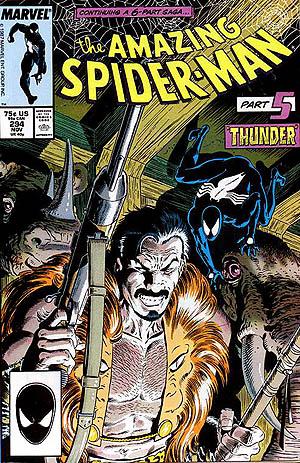 > LoSpazioBianco" />> LoSpazioBianco" />> LoSpazioBianco" height="463" width="300" alt="SM50: Interview with Bob McLeod >> LoSpazioBianco" class="alignright size-full wp-image-60116" />First question: ow was the atmosphere at Marvel in years 1981/87 (during the Shooter “reign”)?
> LoSpazioBianco" />> LoSpazioBianco" />> LoSpazioBianco" height="463" width="300" alt="SM50: Interview with Bob McLeod >> LoSpazioBianco" class="alignright size-full wp-image-60116" />First question: ow was the atmosphere at Marvel in years 1981/87 (during the Shooter “reign”)?
Jim Shooter had very strong opinions about how Marvel comics should operate, and how the comics should look. In a business full of creative people, it rubs a lot of people the wrong way when you try to limit their creative freedom with a lot of restrictions and guidelines. I think Jim meant well, but I also think he liked exercising his power. I personally never had any problems with him, and in fact he treated me very well. I think he always tried to give artists as much money as he could, and I considered myself well paid. I know many others didn’t like his management style. So the “atmosphere” at Marvel during his tenure was often tense and a bit stormy. If he didn’t like your work, you were in for trouble. If you didn’t like doing things his way, you were in for trouble. But I think he brought a much needed order to Marvel, and did a lot of good, at least in the early days.
You’re going to be disappointed in a lot of my answers. I’m an artist, and didn’t pay a lot of attention to that kind of stuff. I concentrated on the jobs I was given, and focused on doing them as well as I could. I liked the characters the way Stan created them for the most part, and didn’t like them getting darker and more violent, more “adult”. But most everyone else seemed to like most of the changes, I think. I know a lot of people didn’t want Peter Parker to get married. I think writers get bored and tired of the status quo, so they want to shake things up and change things. I think they too often try to entertain themselves rather than their audience, and as a result, the audience keeps shrinking.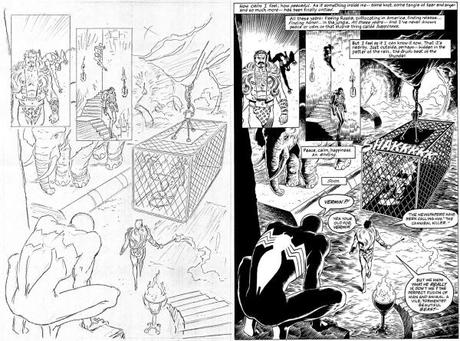 > LoSpazioBianco" />> LoSpazioBianco" />> LoSpazioBianco" height="445" width="600" alt="SM50: Interview with Bob McLeod >> LoSpazioBianco" class="aligncenter size-full wp-image-60111" />You explained that you had no influence on the story of Kraven’s Last Hunt. What did you think when you first read the plot?
> LoSpazioBianco" />> LoSpazioBianco" />> LoSpazioBianco" height="445" width="600" alt="SM50: Interview with Bob McLeod >> LoSpazioBianco" class="aligncenter size-full wp-image-60111" />You explained that you had no influence on the story of Kraven’s Last Hunt. What did you think when you first read the plot?
I didn’t read it. I got the tightly penciled covers from Mike Zeck, and thought it looked like a lot of hard work, but it still looked like a project I wanted to be involved with, because it was going to be spread over all of the Spider-Man titles. But I mainly just took the job because Mike asked me to. I had no idea it would be such a phenomenon.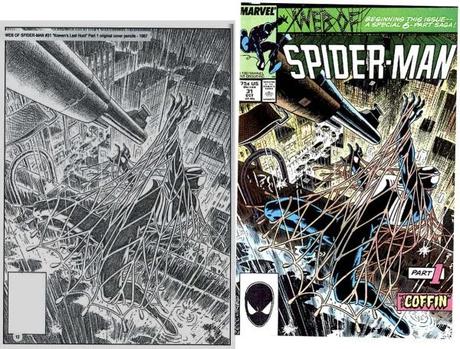 > LoSpazioBianco" />> LoSpazioBianco" />> LoSpazioBianco" height="456" width="600" alt="SM50: Interview with Bob McLeod >> LoSpazioBianco" class="aligncenter wp-image-60114" />
> LoSpazioBianco" />> LoSpazioBianco" />> LoSpazioBianco" height="456" width="600" alt="SM50: Interview with Bob McLeod >> LoSpazioBianco" class="aligncenter wp-image-60114" />
Truthfully, that job came along the same time my first child was born, and I was much more interested in her than in comic books. I thought it was a good story, but I wasn’t really reading comics anymore by that point. I was enjoying my baby daughter and didn’t really think about the comic that much. I think because Marvel and DC used to send me a copy of every comic they published, there were so many horrible comics they sent me that I got tired of weeding through them to get to the good ones, and there were a lot of novels I wanted to read, so I just quit reading comics.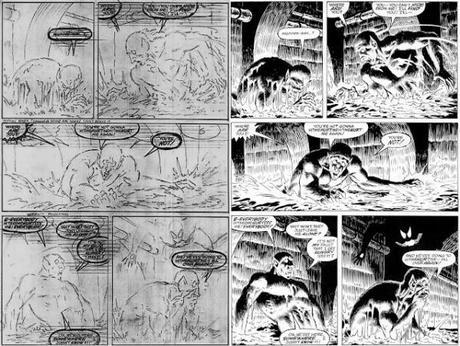 > LoSpazioBianco" />> LoSpazioBianco" />> LoSpazioBianco" height="452" width="600" alt="SM50: Interview with Bob McLeod >> LoSpazioBianco" class="aligncenter size-full wp-image-60113" />Did you feel, while completing the inking, that you were doing some extraordinary issues of Spider-Man destined to be one of the masterpiece of the whole Spider-Man saga?
> LoSpazioBianco" />> LoSpazioBianco" />> LoSpazioBianco" height="452" width="600" alt="SM50: Interview with Bob McLeod >> LoSpazioBianco" class="aligncenter size-full wp-image-60113" />Did you feel, while completing the inking, that you were doing some extraordinary issues of Spider-Man destined to be one of the masterpiece of the whole Spider-Man saga?
Not at all. I had absolutely no idea. For me, this is a job. It’s work. It’s my career. I’m not a fan. It was always about the art for me, not the story. I was fascinated by what an ink line can do. How you can create a picture by making black marks on white paper. That’s what I was interested in.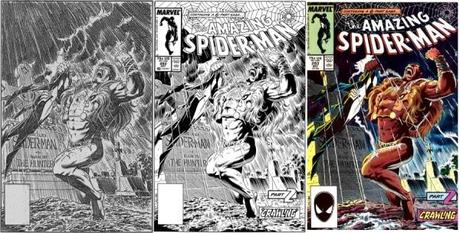 > LoSpazioBianco" />> LoSpazioBianco" />> LoSpazioBianco" height="305" width="600" alt="SM50: Interview with Bob McLeod >> LoSpazioBianco" class="aligncenter size-full wp-image-60123" />Story was really unexpected for most readers; a real travel into madness, death, obsession… How was the reaction of the fans?
> LoSpazioBianco" />> LoSpazioBianco" />> LoSpazioBianco" height="305" width="600" alt="SM50: Interview with Bob McLeod >> LoSpazioBianco" class="aligncenter size-full wp-image-60123" />Story was really unexpected for most readers; a real travel into madness, death, obsession… How was the reaction of the fans?
As I said, I wasn’t paying much attention, really. I don’t remember being aware of the fan reaction until much later. Years later.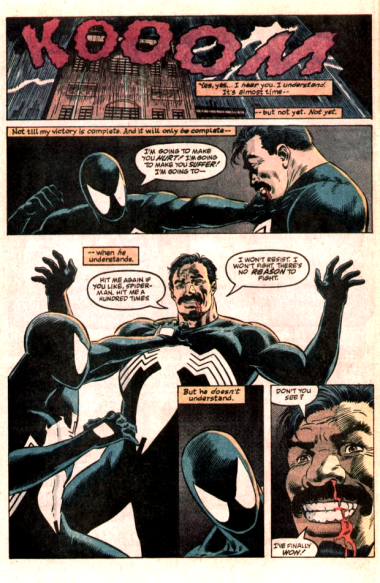 > LoSpazioBianco" />> LoSpazioBianco" />> LoSpazioBianco" height="360" width="236" alt="SM50: Interview with Bob McLeod >> LoSpazioBianco" class="alignright wp-image-60109" />Some pencils of your friend Mike Zeck were really detailed but we know that a lot of pages were just loose breakdowns. Was you “extra” job recognized by fans? I mean, inkers may often get ahead of pencilers by imposing their style; maybe this is the case even if it is not a “fault”…
> LoSpazioBianco" />> LoSpazioBianco" />> LoSpazioBianco" height="360" width="236" alt="SM50: Interview with Bob McLeod >> LoSpazioBianco" class="alignright wp-image-60109" />Some pencils of your friend Mike Zeck were really detailed but we know that a lot of pages were just loose breakdowns. Was you “extra” job recognized by fans? I mean, inkers may often get ahead of pencilers by imposing their style; maybe this is the case even if it is not a “fault”…
The fans were totally unaware that I was contributing as much as I was. Most fans are completely ignorant of what inkers do, and Marvel didn’t even credit inkers as finishers half the time. But fans didn’t know what a “finisher” or “embellisher” was anyway. I worked to satisfy my own high standards, and to impress my peers and the editors who gave me work, not the fans.
Possono interessarti anche questi articoli :
Un’opera d’arte al mese #8 – L’unione della terra con l’acqua
CULTURA
L'Italiano o il Confessionale dei Penitenti Neri
CULTURA,
LIBRI
Le vergini suicide
CULTURA,
LIBRI
Padre
CULTURA,
OPINIONI
Books to Movies: News da Hollywood #12
CULTURA,
LIBRI
[Focus On]: OCULUS.IL RIFLESSO DEL MALE (Movie)
CULTURA,
LIBRI
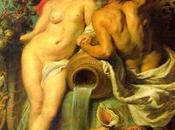
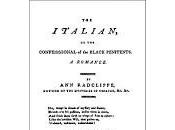


![[Focus On]: OCULUS.IL RIFLESSO MALE (Movie)](https://m21.paperblog.com/i/289/2894186/focus-on-oculusil-riflesso-del-male-movie-L-zfe1eo-175x130.jpeg)

